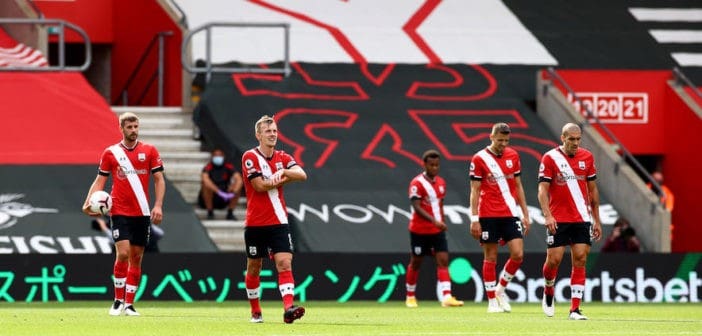If a passage of play ever showed when genius becomes insanity, it would be the second half between Southampton and Tottenham.
It was a 45 minute period that verged on the unbelievable. You could not quite fathom what you were watching. What ensued on the St Mary’s turf was madness of the highest order, risk-taking of towering proportions.
To thieve and thus paraphrase Oscar Levant’s age-old aphorism, Ralph Hasenhuttl’s much-derived genius had ruthlessly switched to insanity. The Austrian is rightly and often lauded for his eccentric, zany pressing game, but the manner of their defeat against Spurs must pose questions into his staunch philosophy.
Is Hasenhuttl’s pressing-frenzied system at a crossroads, or has he got carried away and just took it too far?
For all the rehabilitative progress Southampton have made since a particular game last October – promised myself I would not mention it again – the second half on Sunday bore unwanted resemblances to it. It wasn’t just a loss, a heavy hammering, it was the way in which Southampton self-inflicted most of the damage onto themselves.
Tottenham scored seven goals, two were ruled out by VAR. Saints somehow also managed to concede two goals in the 47th minute in both halves – work that one out. It was as if every Spurs goal was a carbon copy and supporters were just being forced to watch incessant replays of their team being punished by the two primary culprits of Heung-Min Son and Harry Kane.
Taking the lemons out of mouth as I write this, Spurs won 5-2 and weren’t even that good. While the nature of the self-implosion was all too familiar for those in red and white, it felt like we were watching something much deeper, much more complex.
This defeat wasn’t like the last beatdown where the side were so shambolically bad, they were forced to give their wages back. In fact, most of them played quite well. In possession, there was a functional clarity to their play, with speed in transition and purpose in attack. At times Saints overwhelmed Spurs without the ball, displaying the type of cynicism and calculated aggression Ralph Hasenhuttl craves. As strange it sounds now, Southampton were rag dolling Spurs for much of the first period and were heading towards their best performance of the season and by a long stretch, too.
While the nightmare of the second half can draw comparisons to ‘that game’ of last October, the reasons for why such a humiliation would arise was altogether different. This time round, a heavy defeat was significantly down to faults in the system, rather than faults in the personnel. If the 9-0 humiliation was a player failing, then the 5-2 “shame” – in Hasenhuttl’s words – was the system’s.
A press is like an orchestra. It has to be timed and executed to perfection, with all the different facets of the group functioning in exquisite synchronisation. If one instrument or one aspect of the ensemble isn’t perfectly versed, the whole thing collapses and renders ineffective.
On Sunday, it wasn’t the orchestra, nor was it the press, that largely worked well. It was rather the conductor of the 11 instrumentalists. Ralph Hasenhuttl has always been a risk-taking manager, but the insistence he showed on staying high, even when everyone knows it’s going painfully wrong, bordered on disbelief. There’s one thing sticking with how you think the game should be played, which is completely admirable, but it’s another standing firm on something which is so obviously a direct detriment to you.
When Son scored his seemingly unteempth goal of the game, once again running from deep to expose a outrageously high line, you would think the manager or a leader in the side would see its going awry and be prepared to take your licks; just stay compact and limit any further damage.
Not Southampton. This was risk-taking at it’s most extreme. Instead of dropping deeper to avoid potential indignity, they actually got higher. Every attack Saints would rely on the outstretched arm of the linesman to raise his flag as their primary source of defending. Remember the days of dropping deeper as the opposition progresses upfield, towards your goal? Forget about it.
The defending carried similarities to a game you’d see on a Sunday morning at the local park, when the big lad is stationed at the back but had a few pints the night before and is feeling a little hazy. He can’t be bothered to run so just stands on the halfway line, hoping the linesman – usually his mate whose a sub – puts his flag up so he doesn’t have the laborious duty of running back in the greatest optimistic hope he somehow catches the forward.
Spare a thought for Alex McCarthy – a graduate of the traditional, old-school way of English goalkeeping. But this season, he’s been tasked with reinventing himself into Hasenhuttl’s version of Manuel Neuer. The small matter being he’s not got Europe’s best team or Alphonso Davies and David Alaba’s electric recovery pace in front of him.
You could argue Alex McCarthy has come to be Southampton’s most critical player out of possession. With the back four steadfast on basing themselves on the halfway line for the majority of the game, it is up to McCarthy to sweep any balls over the top, and heck, there’s a lot of them. If his starting position is a yard out of place, or his concentration is slightly lagging, he’s going to get punished. The margins for error are so fine, the potential repercussions so great.
Southampton have always been a high-pressing side under Hasenhuttl. But in the first three games of the new campaign, it’s gone to a whole other level. The difference being even when the ball advances towards them, they refuse to give yards and drop deeper. They stay high, play the offside trap and rely on McCarthy’s reactions and starting position to get them out of trouble.
If it’s sometimes considered a kamikaze tactic for Bayern Munich, what do you call it when Southampton are playing it? At least in Bavaria they have the players conducive to the strategy. For Alex McCarthy and the four in front of him, they are only so malleable.
To give him credit, McCarthy is receptive to learning and does make the correct decision to sweep from time to time, often prompting a “good Alex!” shout from his boss. Take the 19th minute against Spurs as a case in point, where a long ball from Ben Davies bypassed the Saints backline and it was McCarthy on hand to clear the ball before Son could reach it.
But the issue is, McCarthy is simply not able to take the right option every time, throughout a 90 minute match. It’s painstakingly obvious the slight stutters and the regular moments of hesitation are tell-tale signs that none of what’s now being asked of him comes natural. So it should come as no surprise when McCarthy does not recognise the triggers to come out every time.
When he doesn’t, the quality of chances Saints give up are extremely high. When McCarthy doesn’t get all his bearings, he reverts to type and stays in his goal – this often leads to a one-on-one chance against him. A better quality of chance also means McCarthy’s less likely to produce regular saves, given how close and how weighted the goalscoring opportunity is in favour of the attacker.
Conceding these types of goals not only amplifies his shortcomings in coming off his line, but is beginning to cause severe harm to the job he’s actually paid to do, making saves.
These are Premier League players, so of course the Southampton side do need to admit some portion of responsibility. Each of Son’s goals came from Harry Kane peeling off to drop deep with Saints players, so intent on winning the ball, following him as if it were bees round honey.
This ultimately left Son to run from deep and reach the ball over the top – meat and two veg type of stuff. It was not some sort of a complicated offensive pattern, where you could forgive Saints being bamboozled by the complex, free-flowing nature of it. Instead, it was continually one long ball that would rip through the heart of the backline and create indecision. Son would pounce and be given the freedom of the south coast to score another.
Once again, Ralph Hasenhuttl spoke afterwards about the lack of quality and lack of fitness in his squad. Admittedly, the Austrian is more than entitled to blame the players’ application or the owner’s acute deficiencies. But Hasenhuttl needs to take stock and accept that his high-octane brand of football is bordering on madness. Introducing such a radical change when there was very little time to implement it has shown to not be wisest.
Right now, Saints are nowhere near their optimal levels and as Hasenhuttl confessed earlier on this week, they have to be to garner any sort of success. But tactical dilutions won’t help that either. The finely-tuned automatisms Hasenhuttl wants are still out of sync and introducing another facet to an already complicated pressing system was never going to be straight-forward.
Embed from Getty Images
Just four weeks ago, Southampton’s high-pressing game was automated and internalised. Now it’s rusty and unpolished. The fragilities in defence and the lack of preparedness in the players means the high line is defensive suicide. Although Hasenhuttl says the second half drop-off was down to a lack of pressing from the front, rather than the high line, it is a tactical tweak which needs to be abandoned.
Southampton travel to Burnley next, not a team to let you press high. Saints’ front foot style will likely prove futile, given Sean Dyche’s preference to simply bypass any press and play direct. Saints haven’t won at Turf Moor in 49 years and it’s not down to misfortune. There has to be a system change, relying on personnel switches to change the tide would be naive.
It’s no secret that Southampton, have an incredible reliance on Hasenhuttl, which is a somewhat dangerous and precarious state of affairs. So when the manager does get it wrong in games, they end up being damning free-fall defeats. When no one else is there to halt the slide, performances like the second half against Spurs occur.
Sunday’s game verged on the deranged. Ralph Hasenhuttl needs to refine his brand of football and get Southampton back on track. Taking a few steps back to go forward is never a bad thing and in Southampton’s case, taking a few steps back in defence would be the place to start.
![Prost International [PINT]](https://prostinternational.com/wp-content/uploads/2021/08/PINTtFontLogoRoboto1536x78.jpg)



